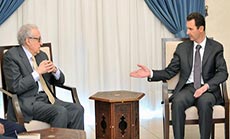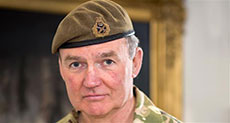
Egypt: Protester Dies, Tahrir Rises against Mursi

Local Editor
Tens of thousands people packed Cairo's Tahrir Square Tuesday, chanting against Egypt's president in a powerful show of strength by the opposition demanding Mohammad Mursi revoke edicts granting himself wide powers.
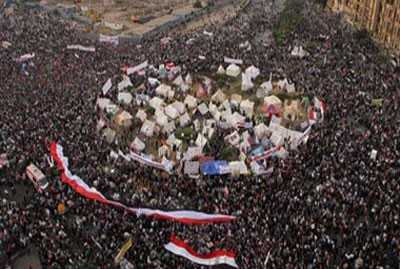 With the mass protests in Tahrir and in several other cities, opposition to the decrees issued last week turned into a broader outpouring of anger against the rule of Mursi.
With the mass protests in Tahrir and in several other cities, opposition to the decrees issued last week turned into a broader outpouring of anger against the rule of Mursi.
Waving Egypt's red, white and black flags, crowds of protesters marched across Cairo to stream into the iconic central plaza, birthplace of the anti-Mubarak [toppled President] uprising. By the evening, it was thronging with a crowd that appeared to be more than 200,000.
Clashes broke out in several cities as Mursi opponents tried to attacked offices of the Muslim Brotherhood, setting fire to at least one.
Ringing out at Tahrir was the central chant of the Arab Spring revolts: "The people want to bring down the regime," and "erhal, erhal," Arabic for "leave, leave."
"Suddenly Mursi is issuing laws and becoming the absolute ruler, holding all powers in his hands," said protester Mona Sadek, a 31-year-old engineering graduate. "Our revolt against the decrees became a protest against the Brotherhood as well."
But Gehad al-Haddad, a senior adviser to the Brotherhood and its political party, said the opposition was "very divided" and that Mursi would not back down.
"We are not rescinding the declaration," he told the Associated Press.
Mursi's edicts effectively neutralize the judiciary, who holds not only executive but also legislative authority.
Protest organizers on a stage in the square called for another mass rally Friday. If the Brotherhood responds with rallies of its own, as some of its leaders have hinted, it would raise the prospect of greater violence after a series of clashes between the two camps in recent days.
Even as the crowds swelled in Tahrir, clashes erupted nearby between several hundred young protesters throwing stones and police firing tear gas on a street off Tahrir. Clouds of tear gas hung close to the ground in the area.
A 52-year-old protester died after inhaling tear gas, the second death in Cairo since Mursi issued the decree.
In the Nile Delta industrial city of Mahalla al-Kobra, workers and activists tried to storm the headquarters of the Brotherhood's political party, but were blocked by Brotherhood members who formed a human chain around the building. The two sides clashed, pelting each other with stones and fire bombs as police fired tear gas, in violence that security officials said left 100 injured.
Rival rallies by Mursi opponents and supporters turned into brief clashes in the Mediterranean city of Alexandria, then anti-Mursi protesters broke into the local office of the Muslim Brotherhood, throwing furniture out the windows and trying unsuccessfully to set fire to it. Protesters also set fire to Brotherhood offices in the city of Mansoura.
Mursi says the decrees are necessary to protect the "revolution" and the nation's transition to democratic rule.
His declaration made all his decisions immune to judicial review and banned the courts from dissolving the upper house of parliament and an assembly writing the new constitution, both of which are dominated by his party. The decree also gave Mursi sweeping authority to stop any "threats" to the revolution, public order or state institutions. The powers would last until the constitution is approved and parliamentary elections are held, not likely before spring 2013.The decrees, said the Brotherhood spokesman Haddad, "cemented the way forward" by protecting the assembly and upper house.
Mursi's supporters canceled a massive rally they had planned for Tuesday in Cairo, citing the need to "defuse tension" after a series of clashes between the two camps since the decrees were issued Thursday.
Source: News Agencies, Edited by moqawama.org
Comments
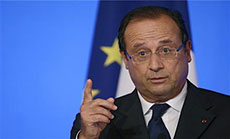
France’s Hollande in Qatar for Warplane Deal
9 years ago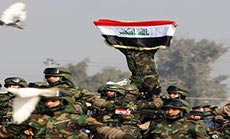
Iraq Police Dismantles Al-Qaeda Protest Site
10 years ago